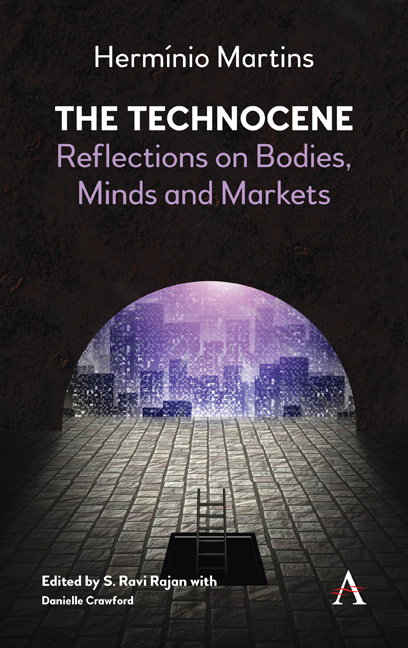Book contents
- Frontmatter
- Dedication
- Contents
- Preface
- Editor's Introduction: Hermínio Martins and the Technocene
- Chapter One The Technocene: On Bodies, Minds and Markets
- Chapter Two Technology Sublime: Paths to the Post-Human
- Chapter Three Perpetual Augmentation: From Eugenics to Human Genetic Capitalism
- Chapter Four The Body Vanishes! Momenta of Discarnation in Technoscience Today
- Chapter Five When Universities Become Body-Shops
- References
- Index
Chapter Two - Technology Sublime: Paths to the Post-Human
Published online by Cambridge University Press: 12 February 2019
- Frontmatter
- Dedication
- Contents
- Preface
- Editor's Introduction: Hermínio Martins and the Technocene
- Chapter One The Technocene: On Bodies, Minds and Markets
- Chapter Two Technology Sublime: Paths to the Post-Human
- Chapter Three Perpetual Augmentation: From Eugenics to Human Genetic Capitalism
- Chapter Four The Body Vanishes! Momenta of Discarnation in Technoscience Today
- Chapter Five When Universities Become Body-Shops
- References
- Index
Summary
It were no slight attainment could we merely fulfil what the nature of man implies.
Epictetus
Eris sicut dii.
We shall be like gods.
Ex machina libertas.
Transhumanist mottoes
Many current projects and visions about the future of humanity and the human being, allegedly well-grounded on the current moving frontiers of scientific and technological advance, envisage not only the substantial amelioration but also the transformation or surpassing of the present condition of the human species. This process would be accomplished through the ‘enhancement’ (a key term of this discourse) of its genome, in conjunction with developments in computation, Artificial Intelligence and the technologies of information and communication (ICTs), regarded as paramount, and often as the vehicles for the next and final stage in the post-biological self-transcendence of the human being, indeed, as they say with respect to the singularity in question, beyond which, as the name suggests, nothing can be known, even in principle. On the way, in the next few decades, we would acquire:
• a ‘new body’, version 2.0, to be followed, presumably, by versions 2.0 plus, 3.0 and so on (Kurzweil 2003);
• a ‘new brain’ (‘the merger of biology and technology’); a ‘new mind’ (‘the merger of psychology and technology’);
• a wealth of ‘smart genes’ or super-alleles;
• ‘super-senses’ aka bionic senses (Geary 2002);
• superlative cognitive competences;
and secure ‘radical life extension’ but with unimpaired quality of life (Wade 2009). In other words, we would acquire the next best thing to biological immortality before attaining genuine, post-biological immortality as virtual beings, a kind of eternal life without life, in the organic sense of the term ‘life’, or indeed of the ‘spiritual’ (Broderick 1999; Kurzweil 1999; Tipler 1994).
Information
- Type
- Chapter
- Information
- The TechnoceneThe Technocene Reflections on Bodies, Minds and Markets, pp. 51 - 88Publisher: Anthem PressPrint publication year: 2018
